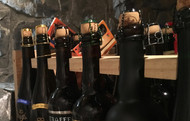The cork stopper is essential for keeping beers over time
Posted by Isabelle Bellet on 29th Oct 2018
The cork stopper is undeniable in wine for 60% of the Swiss who participated in the Coop survey (see their magazine of 23 October). For them, the cork stopper remains the best way to close wine bottles.
What about beer?
What are the differences between the cork stopper, the capsule and the mechanical (rocking) stopper?
For quality craft beers that referment in the bottle (this is called secondary fermentation or second fermentation), and which can age in the cellar, the cork stopper is essential. Why? Because the refermentation in the bottle produces gas which is maintained by the cork stopper which, due to its flexibility, allows a small pressure variation (like champagne) without losing its tightness.
Beers with caps, mechanical caps or canned beers cannot be referment because the bottle or can would explode.
The second fermentation is carried out by adding yeast and sugar during bottling. The beer then matures in the bottle allowing the yeast to do its job. It took generations to develop this particularly complex process. The second fermentation brings a rich and typical taste. The older the beer gets, the more aroma it has and the more pronounced the taste and colour.
So it is not only the wine that can be aged in the cellar, with a bonus. Many beers improve over time. To enable this process, only the cork stopper has the required superior sealing qualities and performances.
Without the cork stopper, the art of wine conservation and ageing would not have reached the heights of refinement we know today. Quality craft beers are taking the same path.

